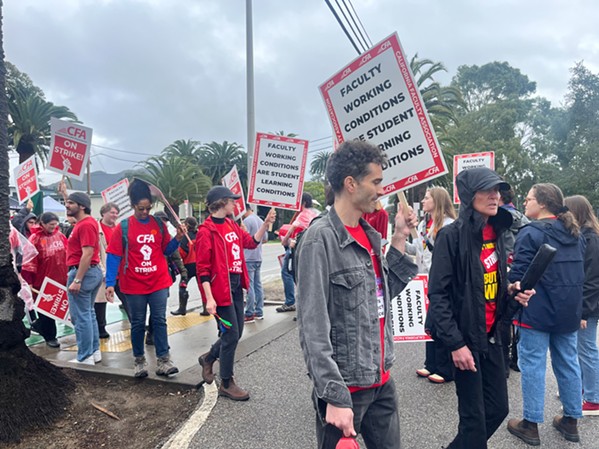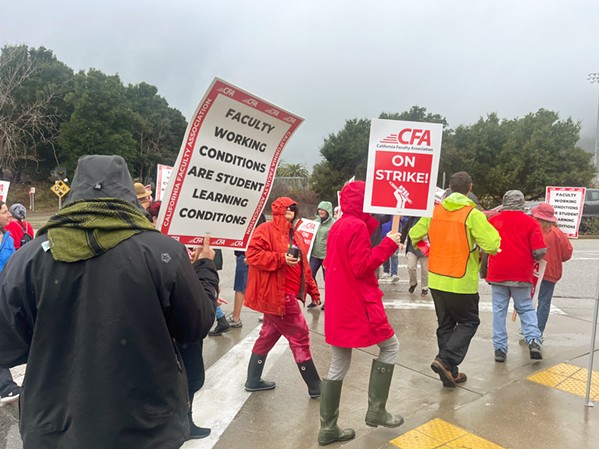Strike's over: CSU faculty end planned week-long action after one day with an agreement some union members see as not good enough
By Samantha Herrera[{
"name": "Newsletter Promo",
"id": "NewsletterPromo",
"class": "inlineCenter",
"insertPoint": "4",
"component": "15264767",
"requiredCountToDisplay": "0"
},{
"name": "Ad - Medium Rectangle CC01 - 300x250",
"id": "AdMediumRectangleCC01300x250",
"class": "inlineCenter",
"insertPoint": "8",
"component": "2963441",
"requiredCountToDisplay": "12"
},{
"name": "Ad - Medium Rectangle LC01 - 300x250",
"id": "AdMediumRectangleCC01300x250",
"class": "inlineCenter",
"insertPoint": "18",
"component": "2963441",
"requiredCountToDisplay": "22"
},{
"name": "Ad - Medium Rectangle LC09 - 300x250",
"id": "AdMediumRectangleLC09300x250",
"class": "inlineCenter",
"insertPoint": "28",
"component": "3252660",
"requiredCountToDisplay": "32"
}]
After an expected week of historic strikes on all 23 California State University (CSU) campuses to demand increased pay and improved working conditions, union leadership came to a tentative agreement, which left many faculty members upset.
"I was stunned when they called it off after basically 12 hours, when they told us it was a five-day strike," Cal Poly English professor Brenda Helmbrecht told New Times. "To get an email at 10 o'clock at night saying, 'Oh, by the way the strike is over and you're teaching tomorrow,' is completely ridiculous."
The California Faculty Association (CFA) announced it came to a tentative agreement with CSU management late on Jan. 22, calling off the planned strike. The union represents 29,000 professors, lecturers, librarians, counselors, and coaches who teach and provide services to the CSU system's 485,000 students.
"Faculty was ready to go; I've never seen so much momentum on behalf of faculty to fight for what we need in order to make the CSU run and to be the most effective instructors we can be," Helmbrecht said. "It seems like the CFA just shut that down."
CFA members were demanding a 12 percent raise prior to the strike. They will receive a 5 percent general salary increase retroactive to July 1, 2023, according to the tentative agreement, as well as another 5 percent salary increase beginning on July 1, 2024, (contingent on the system's budget); increased paid parental leave from six to 10 weeks; increased protection for faculty members who have dealings with police by ensuring a union rep is present during those interactions, and more.
"We've been fighting for a fair wage that keeps up with inflation, for manageable workloads, and to address long-standing racial, gender, economic, and social inequities. This tentative agreement moves us closer to a CSU for everyone," the CFA said in an email to union members on Jan. 22.
However, Helmbrecht said the tentative agreement doesn't include helping professors manage workloads, a repeated negotiation request among CFA members, especially at Cal Poly where student enrollment is expected to increase in 2024 due to a new year-round operations initiative that will allow 600 of the 5,300 incoming freshmen to begin classes in the summer quarter.
"There's no question that I will be teaching more classes with more students at one time," she said. "Our workload will increase exponentially."
Cal Poly SLO's CFA chapter President Lisa Kawamura told New Times that this offer is the best it's going to get even if the union isn't getting everything it bargained for.
"You can please some people some of the time, but not all of the people all of the time, and I definitely think that this tentative agreement is better than the chancellor's agreement," she said. "I think what people need to remember is that we have two choices right now, either the tentative agreement or the chancellor's last best offer. I think there's a lot of wins in this contract."
After the CFA's contract with the CSU ended in 2023, Kawamura said demands relating to workload, health, safety, parental leave, and salary needed to be addressed before signing a new two-year contract. Before the planned strike, the Chancellor's Office offered the CFA a contract that included a flat 5 percent raise, an increase in parking fees, and a department chair stipend.
"We're so behind in pay, and we've just watched our management, our presidents receive a 29 percent raise. We just hired a new chancellor at a million-dollar package," she told New Times prior to the strike. "Many of us are living paycheck to paycheck, and a 5 percent raise plus a raise in parking fees is still going to put us under the poverty line."
Since May 2023, the CFA had been bargaining for a 12 percent pay raise, pay equity, and raising the floor for the CSU's lowest-paid faculty; manageable workloads that allow for more support and engagement with students; more counselors to improve student access to mental health services; expanding paid parental leave; accessible lactation and mike storage spaces for lactating faculty; safe gender-inclusive restrooms and changing rooms; and provisions for faculty interacting with university police on campus.
During negotiations, CSU management offered the CFA a 15 percent raise over three years (5 percent raise each year), an additional two weeks of paid parental leave (from six weeks to eight), and acceptance of 13 of an independent factfinder's 15 recommendations, including gender-inclusive restrooms and increasing department-chair pay. That prompted the planned week of work-stoppage and strikes.
On Jan. 22, picket lines were held at three of Cal Poly's main entrances from 6 a.m. to 6 p.m. Hundreds of faculty, staff, students, and other supporters held signs and halted traffic to demand that CSU management hear their complaints.
Around noon, a CFA rally was held at O'Neill Green where Cal Poly senior Ethan Gutterman told New Times he supported the strikes and encouraged his classmates to call the CSU office and vocalize their support for faculty.
"I used to work in a congressional office in Washington, D.C., and I would get crazy people calling me all the time who I would dismiss and say, 'Thank you for your concern,' and I felt like we were getting hit with that treatment," he said.
Gutterman said a few days prior to the strikes, he and other Cal Poly students received an email from the CSU system that included a Google link. Clicking on the link took him to a Google form titled "Report a Canceled Class or Student Service Here - Cal Poly San Luis Obispo." It made him feel uncomfortable, he said—like a pawn in the fight between the CFA and CSU.
"It was pretty disappointing getting that email," he said.
Kawamura said she was aware of the link asking students to report a canceled class or student service. Although she's not a lawyer, she said, it seemed to break labor laws and the CSU's own policies.
The CSU didn't respond to New Times' request for comment on the link or the 29 percent pay raise for CSU presidents.
Helmbrecht, who's a member of Cal Poly's CFA board, said that canceling strikes after one day was more disruptive to students and faculty than it was to management, when it should have been the opposite.
"Students and faculty were told by the union that there would not be classes this week, and some students picked up extra work shifts and right now they're kind of screwed," she said. "It just shows the union's not really paying attention to its constituents the way that I think it needs to."
CFA members will have the chance to vote on the tentative agreement in the coming weeks. Like many upset faculty members who expressed opinions about the tentative agreement on social media, Helmbrecht said she will be voting no and expects the CFA to return to the bargaining table and come up with something better.
"I would like to have more professional negotiators who push harder and concede less, so whether that means we need to have new leadership, whether that means we need a new union, or whether that means that membership needs to get way more involved in these details, I think all of that is possible and maybe necessary," she said.
Helmbrecht added that the CFA lacks transparency with its members, which has frustrated her for years now.
"I have no idea what conversations happen between them because it was behind closed doors, meaning they're not telling us what the factors were," she said. "That just adds to the frustration that just seems to have been thrust upon us without true consultation. I mean, even our local chapter has really no idea what that conversation was with the CSU." Δ
Reach Staff Writer Samantha Herrera at [email protected].
Latest in News
Comments
Showing 1-1 of 1
Readers also liked…
-

Coast Unified teachers upset over new position's salary and qualifications
Oct 20, 2022 -

SLO police identify alleged driver who hit and killed couple
Dec 22, 2022 -

When the levee breaks: Oceano residents, county officials walk a tightrope of regulations to manage Arroyo Grande Creek, which some say led to the levee's failure in January
May 18, 2023











